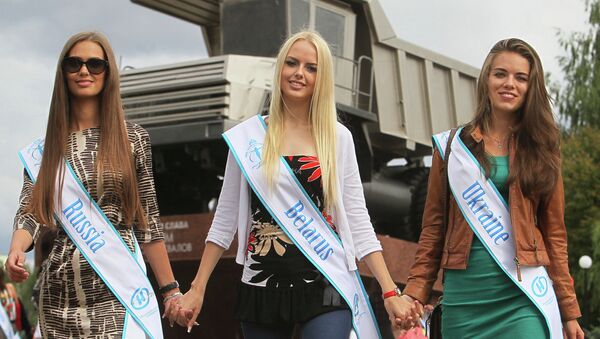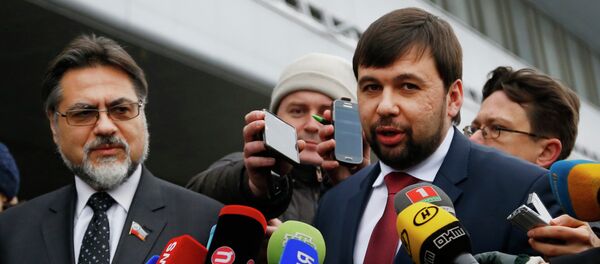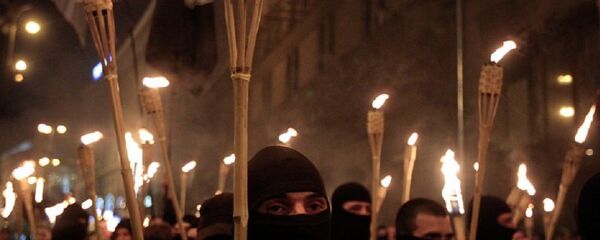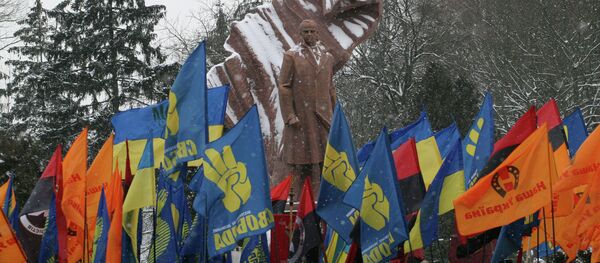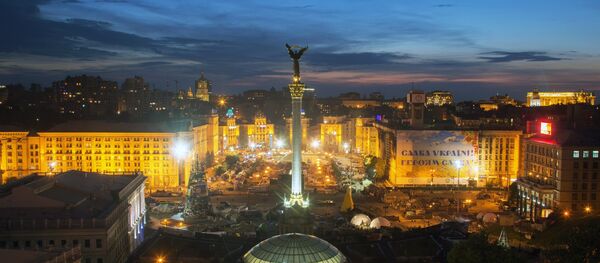A recent poll by independent sociological research firm Levada Center has found that a majority of Russians (55 percent) now have a 'generally poor' or 'very poor' opinion of Ukraine (34 and 21 percent, respectively). This contrasts sharply with peoples' attitudes toward Belarus, with 85 percent of respondents saying they have a 'generally good' or 'very good' opinion of the country (63 and 22 percent, respectively).
Given the three countries' common origins, shared culture and values, and hundreds of years of shared history, the poll results beg the question: Why such a radical split in opinion toward two very similar countries? The answers lie in the two very different starting points faced by Ukraine and Belarus in their post-Soviet history, and the two very different paths the countries' leaders have decided to take over the past quarter century.
Reason #1: Belarus Does Not Have a Split Personality
In 1996, following a referendum a year earlier where over 78 percent of voters voted in favor of economic integration with Russia, Belarus initiated the creation of the so-called Union State with Russia, a treaty aimed at the gradual economic, political and socio-cultural reintegration.
Ukraine on the other hand, right from its difficult political rebirth in 1991, could have been diagnosed with a form of political and sociocultural schizophrenia, with its western regions, with historical ties to Poland and Austro-Hungary, playing a very active political role in attempting to push the country toward the 'prosperity and freedom of the West', while the eastern regions, economically and culturally close to Russia, set up a sluggish resistance to calls by their Western counterparts to rush headlong toward the West.
Ukraine's leadership initially attempted to walk a tightrope between the grand ideals of European integration and of continued cooperation with Russia; post-Soviet leader Leonid Kuchma stated in his inaugural address in 1994 that he hoped Ukraine could ultimately "assume the role of one of the leaders of Euro-Asian economic integration."
In late 2004, following a narrow election campaign between Kuchma's protégé, Viktor Yanukovych and the openly pro-Europe Viktor Yushchenko, Ukraine saw its first 'color revolution', with Yushchenko winning a highly contested recount with 52 percent of the vote, mostly in the country's west and center.
The pent-up energy among western Ukrainians, Kiev's intelligentsia, the country's oligarchs and ordinary Ukrainians tired of Yanukovych's grossly corrupt government, led to Kiev's Maidan protests. Tipped over the edge in February 2014 by mysterious snipers shooting at both protesters and police, the country's pro-EU politicians overthrew Yanukovych, and with the help of armed and organized battalions consisting of radical nationalists, proceeded to take over the country.
Apart from Crimea, whose leadership quickly decided to secede from Ukraine and join Russia before civil war broke out, the traditionally pro-Russian east of the country, disorganized and downtrodden by over two decades of political and economic malaise, were more slow to react, and could not stand up on a national scale to the new regime's openly anti-Russian, occasionally pro-fascist statements and actions emanating from Kiev and the west of the country.
Given post-Maidan Kiev's openly anti-Russian policies, and its aggressive military campaign in pro-Russian eastern Ukraine, it's understandable why Russians may be less than amiable toward today's Ukraine.
Reason #2: Belarus Has Zero Tolerance for the Rehabilitation of Wartime Nazi Collaborators
With the war killing a total of 26.6 million Soviets, including 13.9 million Russians, 6.8 million Ukrainians, and 2.3 million Belarusians, Russian confusion and outrage over the reemergence of fascist symbols, ideals and behavior among their western neighbor might seem perfectly rational.
Unlike Ukraine, Belarus, even in the mess of the period of post-Soviet national reconstruction, found the strength to clamp down very hard on any attempts to associate nationalism with its own wartime collaborationist movements. The greatest symbol of Belarusians' complete and total rejection of collaboration was their decision in a 1995 referendum to replace their country's flag a white-red-white tricolor used by Belarusian collaborators during the Second World War, with its Soviet-era red and green flag, sans hammer and sickle.
Contrary to the situation in Ukraine, where Bandera and his followers have been painted as patriots fighting for a free Ukraine, Belarusian textbooks, media and cultural production over the past two decades have had no qualms about characterizing the country's wartime collaborators as cowards and traitors.
Reason #3: Belarus Does Not Have a Thirst for Revolutionary Fervor
This sense of calm and collectedness seems to translate to politics as well, with Belarusians proving themselves again and again to be averse to revolutionary political fervor as well. While Russians clamored for Yeltsin, who promised in 1990 that Russia would be richer and stronger independently, Ukrainians voted in their majority for independence in 1991, nine months after a majority had voted to stay. Unlike its two East Slavic brothers, Belarusians did not have a powerful revolutionary leader, nor did they hold a referendum. The republic's politicians calmly sat on the coattails of other republican leaders moving toward independence, before formally joining Russia and Ukraine in signing the Belavezha Accords in December 1991 dissolving the Soviet Union. In 1994, voters elected Alexander Lukashenko to the presidency. Tellingly, the young leader was the only member of the Belarusian Soviet republican parliament to vote against Belavezha's ratification.
While Belarus has seen a number of small-scale protests against Lukashenko attempting to emulate the region's color revolutions, first in 2005 and 2006 and then again in 2011 following his re-election, the country's people have shown little appetite for revolution, while the government has shown little tolerance. Following 2011's attempts by a small group of protesters to break into Belarusian government headquarters, Lukashenko announced firmly that any attempt to overthrow the government will be defended against, characteristically adding "and believe me, we will do it."
Reason #3.5: Belarusians' Lack of Revolutionary Fervor is Based in a Successful Economic Development Strategy
As the recent tussle between oligarchs-turned politicians Petro Poroseshenko and Igor Kolomoisky has shown, the Maidan Revolution has failed to unseat an unchecked economic elite which has subverted political power and used it for its own interests, to the detriment of ordinary Ukrainians. Belarus's stability also stems from the virtual absence of oligarchs, and from their complete and utter lack of influence over the country's politics. While political scientists have long classified Ukraine's political elites according to which oligarchic clan they belong to, Belarus managed to avoid robber privatization before it could begin, hence preserving the country's national wealth in the hands of the state and preventing the rise of politically and economically unpredictable and unreliable economic elites.
Belarusians' aversion to political revolutions, combined with their socio-economic model of so-called market socialism, has had a positive impact on ordinary peoples' living conditions as well. With almost equal starting points in the early 1990s following the Soviet collapse, Belarusian economic and human development ratings have since far outstripped Ukraine's. The country's nominal GDP per capita in 2013 ranked 75th in the world, compared to Ukraine's 109th (equivalent to $7,577 vs. $3,930, respectively). In HDI terms, in 2013 Belarus ranked 53rd, compared with Ukraine's 83rd place.
Russians, concerned with the idea that color revolutions occurring in one country could spread to others, are naturally grateful to have as a neighbor at least one country which seems immune to the phenomenon. Moreover, ordinary Russians upset over the privatization of national wealth occurring in their own country in the 1990s look to Belarus as a model of the kind of economic system Russia itself may aspire to one day.
Reason #4: Belarus's Leadership Conducts Itself in a Rational Way, With a View Toward the Long Term
In contrast to Ukraine, which has had a turbulent political history ranging between tightrope-walking moderates and pro-Western diehards, Belarus seems to have been fortunate enough to have seen the election of an anti-corruption, no-nonsense politician whose main priority seems to have been improving ordinary Belarusians' lives. This, in addition to the stability and relative economic well-being the country's post-Soviet leadership has brought ordinary Belarusians, is something most Russians can understand and appreciate.
When asked at a recent press conference with Russian journalists about what he saw as the main difference between Russians and Belarusians, Lukashenko answered that there is virtually no difference, noting that "Belarusians are simply Russians, with a seal of quality." Compared with the kind of rhetoric emanating from Kiev lately, Lukashenko's words serve as quite a compliment.
